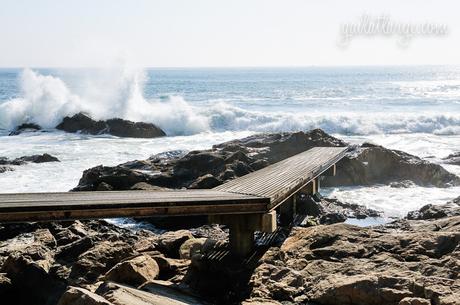
I spent the day in Porto, bringing Ice with me to spend time with people in the sunshine. We enjoyed the comraderie and Ice loved racing around Casa Tait full-tilt without a leash, although he barked at some people and nearly got us ejected. Silly dog…
In the course of the day I had some interesting conversations about expat life, which I’ve been thinking about since then. Rather than turn this post into a brain-dump, I’ll try to distill those thoughts and reflections into paragraphs. * ramble alert * Grab a drink.
Expat Friendships Are Easier To Make, But Can They Go The Distance?
Expatriates are people who are in a foreign country temporarily, usually for work reasons. But in this wider scenario of expatriate living there are sub-groups which include people like me, who call ourselves expats only for simplification but are technically immigrants because we have a goal of full settlement and integration into our new country with no intention of returning to the home country. We arrived on a one-way ticket, and we have no plans to pick up and leave unless the situation calls for it.
A not-so-small part of my expat life is invested in making new friends, a process which is atypical for middle-age — by this point most people already have their circle of friends and it hasn’t changed in years. People who haven’t moved around much don’t see any need in expanding their friend group, thereby creating a barrier, a guardedness, which takes longer to get past. I’ve noticed it can give misleading impressions that locals are less friendly and expats are more friendly, but in my experience it’s often not the individual’s personality but the situation, depending on which group you happen to be in at the time. If you’re the expat actively looking for friends it becomes relatively harder to get to know a local than another expat for many reasons, especially if there’s a new language to learn, no local work network, and no community ties yet. While living in your home city, you’re not actively looking for foreigners to befriend and thus appear less friendly and open when compared to an expat. Friendliness, or at least the appearance of it, has much to do with circumstance.
(On a related note, I notice this factor of circumstance in travel, too: two neighbouring countries may act as rivals at home, but put them on the other side of the world and they’re friendlier and much nicer to each other!)
There are also some false starts. People with good intentions making introductions based purely on language, for example: “I know a Canadian, you should meet so-and-so!” (I totally made that up, I haven’t actually met a Canadian living here, although two have emailed me. But replace that with any native-English speaker, and you get the idea.) Just like the starter home, there are also starter friends. Sometimes it just doesn’t work out for one reason or another. It can get mighty discouraging. Yet, it’s still worth making the effort because when you make strong connections with people and find the true friends who are also supportive and empathetic, it can make all the difference in the world — wherever you are.

The Toll On Relationships
People who have moved around throughout their lives are accustomed to the realities of transience — breaking the ice, cultivating friendships, maintaining them, saying good-bye, separation, trying to maintain friendships long-distance — because it comes with the territory, not because we particularly like it. This repeating cycle is predictable but really draining unless you’re an extreme extrovert. Which I am not.
Then there are people who are hard to keep track of once long-distance, who are terrible at responding to emails, ignore Facebook, never call or have Skype open…
* raises hand *
I’m totally guilty of all of the above, and the older I get the worse I am at keeping in touch. I used to be a very good long-distance friend, making sure I kept in touch with everyone. But with this latest move I’m turning out to be a terrible long-distance friend, which doesn’t bode well for me. I need to work on this, I know.
It is my belief that if you ask most expats, the toll on relationships is the one casuality of expat living that is the hardest to bear. Everyone hates the packing and moving, but it’s possible to outsource that sort of pain. The emotional side, not so much.

It’s A Long Story, You Don’t Really Want To Hear It
That said, it explains why expats are naturally drawn to other expats: we can relate to each other. Who can better understand the feelings of cultural isolation and disconnectedness than someone recently and similarly uprooted?
Problem is, even if we can relate to each other, it doesn’t mean we will. Everyone has different reasons for leaving their countries, and some are more common, socially-acceptable, or relatable than others. In 2006 I was repatriated to Canada once I became a widow (a euphemism for leaving before I got deported), but I chose a new city and had to face the simple getting-to-know-you questions in an emotionally fragile state. I became withdrawn. Although I needed friends, I was emotionally spent and I wasn’t exactly scintillating company, either. Widows are social lepers, I learned. What, nobody wants to talk about cancer and death and contested wills?
When unintentionally loaded questions threaten to chill a warm-up conversation, it’s easier to give a pat answer than a full explanation. How many times do people ask “How are you?” and you can’t really tell the truth because the answer is just too involving? And the very few people remotely interested in the answer are… remote. I recall times in my previous expat lives when I was desperate to talk to someone, and there was no-one to talk to because all other choices were prohibitive financially or everyone I knew was 8 or 14 time zones away, asleep. In the pre-internet, pre-VoIP, expensive international phone call days, there was no choice but to either write a letter or talk to the sky.
These days it’s easier to keep in touch with long-distance friends, but it’s really not the same as sitting across from someone having direct, face-to-face conversation. I’ve met other expats with horrific stories. It’s a continual dilemma: who to share with? What if the backstory is sad? What if you’re a refugee? What if you happen to be from a country in conflict, with poor diplomatic ties, and politics you don’t agree with? Leaving behind a country exposes a person to all sorts of judgement, and it’s not our place to judge because we don’t know the full story and neither are we entitled to it.
The best thing we can do for each other is to listen when someone feels like talking. No unsolicited advice, no life-affirming Buddhist quotes pulled from social media, no interruptions, no stories of someone else being worse off (it doesn’t reduce the suffering of the person talking).

You Are The Master Of Your Own Ship
One reason why I tend to gravitate to other expats has everything to do with a mentality, though, and not nationality. It’s a generalization of course, but largely true: people who choose this crazy life of upheavals have a tacit understanding that life is full of choices, although not all choices are created equally. I can’t even begin to know the gravitas of decisions weighing upon people fleeing from war, poverty, persecution, and violence. They risk their lives to leave everything behind including family, assets, status. Those choices are made out of desperation, life and death, not “Where shall I retire?”
For those of us lucky enough to have a reasonable set of available choices, the stresses stem from bureaucracy, visa issues, family illnesses, lots of uncertainty, searching for a job and a place to live in a foreign country. If we don’t like a job, we leave it rather than put up with high levels of dissatisfaction and low morale but it is still stressfull to leave behind what is familiar. We don’t choose our relatives but we can choose our friends, and the circle of friends resembles more of a subway map, with lines and extensions going in all directions. It’s a messy life, but we chose it. We own it.
Possibly related posts:
- Get Unstuck Life is too short to be stuck. If you don’t feel stuck, feel free to skip over this post — there are (to date) 4,749 others. I’m down to nine...
- Happy Birthday, USA! May 31, 2008 Jim Thorpe, Pennsylvania Here’s to “life, liberty, and the pursuit of happiness…” I suppose the best way to describe my relationship with the United States, after all...
- When I Was 15; Now That I’m 40 While searching in my archives for something else this evening, something really banal like an invoice I’d sent last year, I came across this text file titled “When I was...
- It’s Official: I’m A Resident Of Portugal Much to our surprise, just under four weeks after our meeting with SEF (Serviço de Estrangeiros e Fronteiras) to apply for my residency permit, a notice came in the mail...
- Seeing English Movies In Portugal My husband was horrified when I pulled out my phone to record a clip of The Muppets Most Wanted trailer in Portuguese — “You’re not allowed to record! They have...

